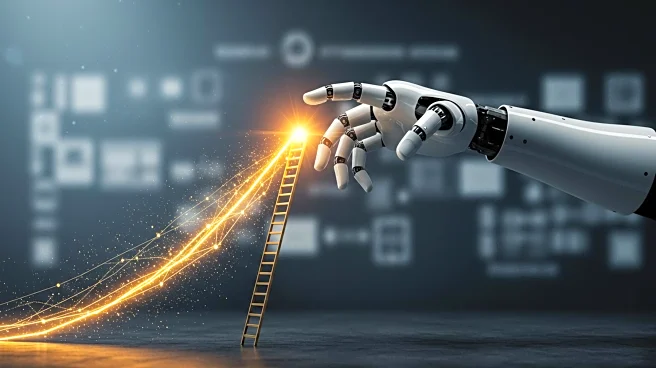What is the story about?
What's Happening?
The Trump administration has unveiled a comprehensive plan to revamp the U.S. workforce system, focusing on artificial intelligence (AI) skills development and rapid retraining. This initiative, announced by the Departments of Labor, Commerce, and Education, aims to move away from the traditional 'college-for-all' model, which the administration claims has not met the needs of employers or workers. The strategy emphasizes AI literacy and skills development, proposing pilots to drive rapid reskilling and foster AI-era innovations. The plan includes expanding Workforce Innovation and Opportunity Act (WIOA) waivers to consolidate workforce training grants and invest in outcome-based pilot programs. Additionally, AI tools and virtual reality will be used to supplement workforce coaching, with plans to scale tech-enabled navigation and coaching methods. The agencies are also considering a national framework on AI literacy to align training with industry needs.
Why It's Important?
This initiative is significant as it addresses the evolving demands of the labor market in the AI era. By prioritizing AI literacy and skills development, the plan aims to prepare the workforce for high-wage careers and enhanced productivity opportunities presented by AI. The overhaul seeks to create a more agile and innovative workforce system, reducing the risk of the U.S. falling behind in developing an AI-ready workforce. The focus on rapid retraining and career mobility is expected to benefit workers displaced or at risk due to AI advancements, ensuring they can transition into new roles. This approach could lead to a more dynamic and responsive workforce, better aligned with the needs of modern industries.
What's Next?
The federal agencies plan to implement coordinated changes across K-12 education, postsecondary education, and workforce development. They will expand WIOA waivers and authorities to facilitate these changes, while also investing in digital platforms to promote career mobility. The agencies are considering releasing a national framework on AI literacy and providing funding for regional AI learning networks. These efforts aim to embed AI skills across higher education and speed up AI skill growth nationwide. The Departments of Labor and Commerce will pilot rapid retraining models for workers affected by AI, testing scalable approaches validated by employers.
Beyond the Headlines
The proposed overhaul could have long-term implications for the U.S. education and workforce systems. By shifting away from the 'college-for-all' model, the plan may lead to a broader acceptance of alternative education and training pathways, such as apprenticeships and industry-led programs. This could result in a more diverse and inclusive workforce, with opportunities for individuals from various educational backgrounds. Additionally, the emphasis on AI literacy and skills development may drive innovation and competitiveness in the U.S. economy, positioning the country as a leader in AI technology and workforce readiness.
















